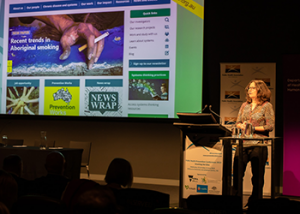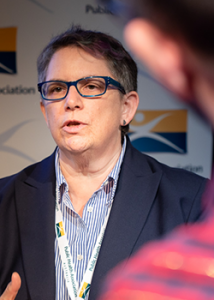Call for new approaches to prevention

DATE
TYPE Prevention Centre News
Prevention Centre Deputy Director – Research, Professor Lucie Rychetnik, presented the case for an integrated agenda of prevention research and advocacy that recognised human and planetary health as linked systems.

Drawing on the work of Kate Raworth and her book Doughnut Economics, and the recent Lancet Commission on Obesity, Undernutrition and Climate Change, Professor Rychetnik said a significant step forward would be to start including the triple bottom line of health, economic and environmental measures as a standard approach to prevention.
She spoke about the Lancet Commission’s recommended ‘double-duty’ or ‘triple-duty ‘actions – interventions that can be effective against the common drivers of poor nutrition and climate change.
For example, transport mode shifts can address obesity by promoting active travel, reduce under-nutrition by making fresh food more accessible, and benefit the climate through lower carbon dioxide emissions.
The biggest problem is that while we know what can work, often these polices are not being implemented.
Professor Lucie Rychetnik
“There is potential for more aligned research and advocacy across different sectors to collaborate for local solutions that will benefit not only chronic disease prevention but that will also have other benefits,” she said.

Leading international systems thinking expert Professor Diane Finegood told the conference that public health researchers and policy makers needed to adapt their scientific approach to deal with increasing complexity.
The current approach – to identify the causes of a problem and test solutions – is better suited to complicated rather than complex problems, she said.
“It’s like baking a cake, launching a rocket to the moon and raising a child. Baking a cake is a simple problem that you can do by following a recipe. Launching a rocket is complicated and you need expertise, but the solution is replicable. But raising a child is a complex problem because expertise isn’t helpful, and each child is unique,” she said.
“When we’re trying to address complex problems, taking a linear, reductionist approach doesn’t work. Our approach to complex problems needs to change.”
The best way to approach complex problems was to develop a shared understanding of the problem so that different actors could see themselves as part of a larger framework, she said.
Professor Finegood called on delegates to contribute to an evidence base for systems thinking so that they would be better supported by policy and decision makers.
“Intuitively, systems approaches make sense – we know that building trust, developing a shared understanding and surfacing people’s deeply held beliefs are important. But we need good science to back up these claims and show that this stuff works,” Dr Finegood said.
“We have made the case that policy needs to be based on evidence. Now we need to build the evidence base so the time and resources needed for a systems approach are recognised and invested in.”
Professor Finegood is based at Simon Fraser University in Vancouver, Canada, and is a member of the Prevention Centre’s international scientific advisory committee. She has played an important role in guiding the Prevention Centre in trying to address the complex problem of prevention in different ways, such as through partnerships and building trust.



